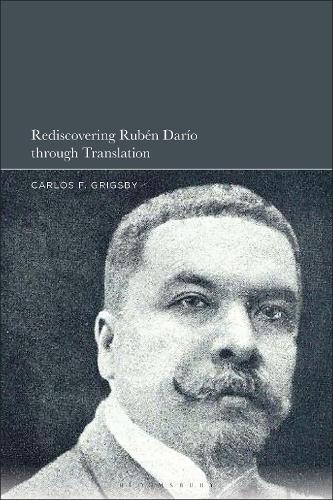
Rediscovering Rubn Daro through Translation
(Paperback)
Available Formats
Publishing Details
Rediscovering Rubn Daro through Translation
By (Author) Dr. Carlos F. Grigsby
Bloomsbury Publishing USA
Bloomsbury Publishing USA
22nd January 2026
United States
Classifications
Professional and Scholarly
Non Fiction
Translation and language interpretation
Bilingualism and multilingualism
Comparative literature
861.5
Physical Properties
Paperback
184
Width 152mm, Height 229mm
Description
A long overdue examination of Rubn Daro's multilingual work and influences alongside the contexts and politics of canonization in world literature.
Rediscovering Rubn Daro through Translation addresses the peculiar obscurity of Daro by asking these questions: How can one of the most important writers of a major world language be almost entirely unknown in the English-speaking world How is it that other writers of the same language (e.g., Lorca or Garca Mrquez) achieve widespread recognition in the anglophone world, while he remains unnoticed What role does translation play in this What can it tell us about the way in which world literature is articulated
Carlos F. Grigsby approaches Daros oeuvre through translation. In doing so, he explores not only the place of Daro in the translation of Spanish American literature into English, but also the place of translation in Daros own writing. The result is a double-sided painting, as it were: the recto is titled Translation in Daro and the verso Daro in Translation.
This book challenges the field of world literature by revealing some of the biases present in its representation of Spanish American literature. It adopts a multilingual framework chiefly using English, Spanish, French, and to a lesser degree Latin and Catalan in analyzing Daros writing alongside that of his contemporaries. As a result, it reveals the multilingualism of Daros own writing, opening new avenues for the study of his work and of Spanish American modernismo more generally.
Reviews
Grigsby's detailed comparisons of Darios early poems with the French works that inspired them demonstrate with ground-breaking clarity that many can be classified as creative rewritings, or free translations, of works by Gautier, Arthur Rimbaud or Paul Verlaine. ... [Daro] was included only gradually, and not always successfully, in the more active culture of translating Spanish American literature ... that began to flourish in the 1960s. Grigsbys unsparing assessments of these translations flaws are convincing. He is bold enough to offer translations of his own as correctives. ... This daring, intelligent book provides important new insights into Darios verse. * Times Literary Supplement *
Carlos F. Grigsby discovers a new way of reading Rubn Daro. Daros poetry emerges at the crossroads of multiple languages and transnational cultural traditions, and Grigsby argues that Daros poetry itself is a translation, that is, a work on languages, on the articulation of languages, and an experimentation with differences. Daros writing has been extensively studied with a focus on the cultural archives with which he was in dialogue. This book proposes that his poetry is a way of using other literatures to forge ones own, not only as cultural archive but also as a linguistic one. By this way of reading, the author presents a Daro in conversation with the languages of his contemporaries and with the classics, a Daro who still lives in those dialogues and whose work regains relevance in the framework of translations. * Graciela Montaldo, Professor of Latin American and Iberian Cultures, Columbia University, USA *
Grigsbys superb book offers a master class on poetic analysis and translation. He rigorously unveils Daros radical ingenuity and creative engagement with multiple languages, often obscured in its critical reception by misconceived ideas of imitation, and shows how mistranslations of Daros poetry into English have contributed to rendering him almost invisible in Anglo-American literary circles. A trailblazing contribution to Daro, modernism, and translation studies. * Alejandro Mejas-Lpez, Associate Professor of Spanish, Indiana University, USA *
Author Bio
Carlos F. Grigsby is a Nicaraguan poet and a lecturer in Latin American Studies at the University of Bristol, UK. He has published articles on Daro in journals such as the Bulletin of Spanish Studies and Modern Language Review, and chapters in collections such as Multilingual Literature as World Literature (Bloomsbury, 2021) and Central American Literatures as World Literature (Bloomsbury, 2023).
